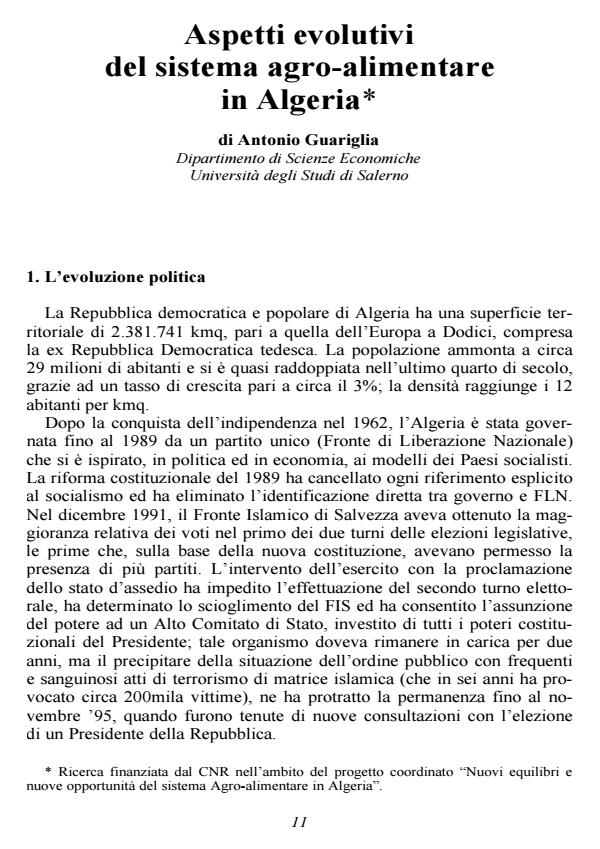Aspetti evolutivi del sistema agro-alimentare in Algeria
Titolo Rivista ECONOMIA AGRO-ALIMENTARE
Autori/Curatori Antonio Guariglia
Anno di pubblicazione 1 Fascicolo 2000/1
Lingua Italiano Numero pagine 7 P. Dimensione file 16 KB
DOI
Il DOI è il codice a barre della proprietà intellettuale: per saperne di più
clicca qui
Qui sotto puoi vedere in anteprima la prima pagina di questo articolo.
Se questo articolo ti interessa, lo puoi acquistare (e scaricare in formato pdf) seguendo le facili indicazioni per acquistare il download credit. Acquista Download Credits per scaricare questo Articolo in formato PDF

FrancoAngeli è membro della Publishers International Linking Association, Inc (PILA), associazione indipendente e non profit per facilitare (attraverso i servizi tecnologici implementati da CrossRef.org) l’accesso degli studiosi ai contenuti digitali nelle pubblicazioni professionali e scientifiche.
Even if it’s estimated that Algeria has potentially around 39 millions hectares of cultivable grounds, at present, the SAU is estimated equal to only 8 millions hectares (3% of territorial surface) situated in the almost totality along the fruitful and narrow coastal plan, while around 31 thousand hectares are pastures or uncultivated groundes; besides, only few more than 500 thousand hectares they are irrigated (7% of the SAU). The agricultural production value represents 16% of gross internal production and the primary sector workers amount to around 20-25% of active population, having also reduced of around half million, representing so an exception between the Countries Third Mediterraneans that, on the contrary, have seen or to increase or to maintain unchanged the demografic pressure on the agriculture. The annual middle rate of growth in the last decade of the food production has been equal to 5-6%; nevertheless, the agricultural-alimentary commercial balance has remained strongly debit. In practice, the Algerian agriculture satisfies only half of the Country food requirement and shows a strong unbalance of the agricultural-alimentary balance; this appears serious for a Country in which 50% of per head income is destined to feeding and that in the seventies it drew a main point source of currency from the export of agricultural products (equal to half oil products). In short, it need to complete the liberalization process of the sector, to extend the irrigated surface, to make cultivable other inside territories, to increase the struggle to the desert grounds and to intensify the economic cooperation, technique and financial with European Union Countries that, in turn, would commit a serious error of political and economic myopia if they underestimated the importance that also assumes for them (terrorism, wild immigration, etc.) the development of the Countries Third Mediterraneans and, between these, that of Algeria. In fact, in the scenery of the accords stipulated in the Euromediterranean Conference of Barcellona in the November 1995, finalized to the constitution of a free exchange zone between the European Union and twelve Countries Third Mediterraneans within 2010, the European Committee has introduced, in 1996, a project for an accord of association with Algeria whose negotiations have started in the March 1997.
Antonio Guariglia, Aspetti evolutivi del sistema agro-alimentare in Algeria in "ECONOMIA AGRO-ALIMENTARE" 1/2000, pp , DOI: